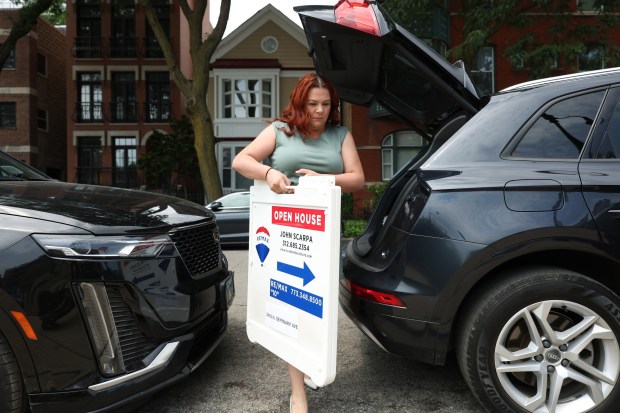Ta Juana Tang, 45, bought a home in Frankfort, a southwestern suburb of Chicago, during the COVID-19 pandemic when she started working remotely.
But when in-person work started to return, Tang’s commute became too much. In April, she sold her Frankfort townhome and purchased a four-bedroom home in West Town.
“When you work in construction, I’m in the office at 7:00 (or) 7:15 a.m.,” said Tang, who owns a consulting firm that provides services to the real estate development industry. “It was a mental health move.”
Tang is not the only Illinoisian who was motivated to move back to the city from the suburbs as her remote work started to fade. Although fewer homes changed hands in Illinois during the first six months of this year compared with last year, many residents who found new houses they could afford moved. Median home sales prices in Illinois also reached record highs in June.
Selma Hepp, chief economist at the real estate data firm CoreLogic, said that while other real estate markets are seeing home price growth level off, Chicago and some other cities that were not popular locations to move to during the pandemic are catching up on home price appreciation now that people like Tang are returning to the office and, in turn, moving back to cities.
“Chicago is not one of those markets where we saw a lot of inventory so as a result of that, home prices continued to feel pressure because there were more buyers out there than sellers,” Hepp said.
Hepp said that this lack of inventory and affordability are still a challenge in the national real estate market, but particularly in Chicago and the rest of the Midwest. And people with limited incomes and a lack of intergenerational wealth to lean on are still getting shut out of the market, Hepp said.
In June, the median sales price of a home in the city limits was $379,925, up from $362,000 in May, according to data from Illinois Realtors, a trade association for real estate agents. The median sales price in June was $375,000 for the Chicago metro area, up from $360,000 in May, and $315,050 statewide, a record high for the state since Illinois Realtors began tracking the data in 2008. In May, the median sales price statewide was $300,000.
The national median existing-home sales price — which excludes new construction homes — reached a record high for the second month in a row of $426,900, the 12th straight month of year-over-year price increases, according to data from the National Association of Realtors.
Take a look at the map below to compare home values across the state. Search by ZIP code or hover over the map to see the average home value in that area.
In Chicago and statewide, the spring market, typically the hottest time of the year for real estate transactions, did see some of the usual month-over-month upward trends in home sales and inventory, according to Illinois Realtors.
Yet, the number of homes sold in Chicago was down 15% in June compared with the same time last year, and the total number of sales between January and June was 4.8% lower than the same period a year earlier.
And compared with last year, the Chicago market saw significant declines in inventory, according to Illinois Realtors. For the month of June, Zillow found inventory levels to be 52% lower in the Chicago metro area than prior to the pandemic.
National existing-home sales declined 5.4% month-to-month and year-over-year in June, with national inventory levels increasing 23.4% from one year earlier, according to National Association of Realtors data.
Jaclyn and Austin Waters, both in their early 30s, said they were lucky to find their home. They experienced the fast-paced, grab-what-you-can Chicago real estate market when they purchased their first home in April, a four-bedroom property in Norwood Park, from the family members of an older adult couple that had died.
They said that they had been preparing to buy a home for six to 12 months and had three hours to put in an offer on the eighth home they saw in their first weekend participating in open houses. The home had been on the market for 24 hours and received at least three other offers, they said. The couple won out with a bid $30,000 over the asking price for a purchase price of $480,000.
“I was definitely surprised to be in a bidding war,” said Jaclyn Waters, who works as an engineering project manager for a video game company. “I think I thought with the interest rates where they were, there might not be as many buyers on the market.”
The couple landed a 6.49% mortgage rate, and their monthly payments, which include property taxes and insurance, are around $3,500, they said. The couple opted for what they think could be their “forever home,” instead of looking for a starter home given the uncertainty around the future market, Jaclyn Waters said.
In June 2023, typical monthly 30-year, fixed-rate mortgage payments in the Chicago metro area for homebuyers who purchased with a 5% down payment and a 7% mortgage rate show a monthly payment of $2,931, requiring an annual income of $117,240, according to Zillow data. If a homebuyer makes a 20% down payment with a 7% mortgage rate, the monthly mortgage payment goes down to $2,352, requiring an annual income of $94,080, according to Zillow.
The data is based on Zillow’s June assumed purchase price for the Chicago metro area, which was $326,426, a 6% increase from last June’s $307,880.
Freddie Mac data shows the 30-year, fixed-rate mortgage average starting to rise again in April from March, peaking for the second quarter in the first week of May at 7.22% before falling again to a high 6% in June.
The reason for the lack of inventory locally and nationally is that many sellers remained unenthusiastic about swapping the 2% to 3% mortgage rates they secured during the pandemic for ones more than double. Many buyers can afford less in the market due to the elevated rates.
Tang was prepared for the jump in her mortgage rate.
She had a 3.75% mortgage rate on the Frankfort home that she sold for $525,000 in April, and now has a 6.875% rate on the $1 million, four-bedroom home that she purchased in West Town.
Her monthly mortgage payments, which include property taxes and insurance, come out to around $7,200, she said.
The process of buying the West Town house, Tang’s fifth home purchase, took only a few weeks from start to finish. Tang said this time was different from her prior home searches because there was not a plethora of inventory on the market.
“The inventory on the market was pretty low, so much so that it’s like we were seeing so many units, and (they were) not what we are looking for and (we thought) we are just going to wait,” Tang said. “And then we found that unit, which was really perfect.”
Hepp, of CoreLogic, said she doesn’t anticipate the real estate market to shift this summer.
“I honestly don’t see things changing that much simply because mortgage rates are still elevated, and there is this anticipation in the air that mortgage rates will come down later in the year,” Hepp said.
Chicago Tribune’s Claire Malon contributed.




